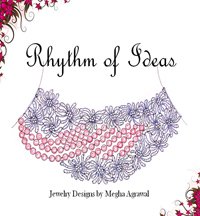Step Cut and Mixed Cut Diamonds
On this page you will get to know about Step Cut and Mixed Cut diamonds and how these are different from brilliant cut diamonds.
Step Cut
Step cut diamonds have either square or rectangular shape and are also termed as Table diamond.
 |
| Step Cut as viewed from top |
Step cut diamond is characterized by:
- Concentric rows of trapezoidal facets running parallel to the girdle. Due to this, facets of diamond resemble steps of staircase, therefore giving this cut its name.
- Bottom of diamond is not pointed and does not have culet. Instead it has "Keel" running through pavilion.
- Crown and pavilion of step cut are shallow as compared to round brilliant cut. Due to this, luster and sparkle of stone reduces, but this makes the stone more elegant and enhances its clarity.
My suggestion: While choosing Step Cut diamond, lot of emphasis should be given on clarity of stone, as even a slightest of imperfection and inclusion is not allowed in this cut. This is because imperfections are easily visible in Step Cut diamond.
Types of Step Cuts
The different types of step cuts are as follows:
- Emerald Cut
- Baguette Cut
- Trillion Cut
Emerald Cut
This cut is derived after rounding off step cut diamond. Since, sharp and square corners lead to fracture and cleavage, so corners of emerald cut stone are truncated, giving it octagonal shape.
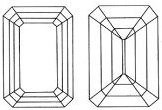 |
| Emerald Cut - Viewed from Top and Bottom |
Since, the bottom of emerald cut stone is shallow, sparkle in this cut is less as compared to round brilliant cut. However, as the emerald cut facets are broad it enhances the clarity and color of diamond.
Therefore, only stones with high clarity (i.e. with very few or no inclusions) should be given emerald cut, as this cut further enhances the clarity of diamond. On the other hand, even a small inclusion is visible if stone undergoes emerald cut. So, low clarity stones are not given emerald cut.
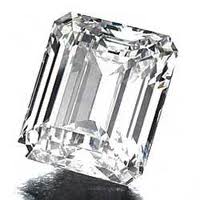 |
| Emerald Cut Diamond |
It’s best suitable as center stone for engagement and wedding rings.
Baguette Cut
"Baguette" is a French word meaning long narrow loaf of bread. It has slender rectangular shape with sharp and pointed corners. This cut was very popular in Art Deco and Art Nouveau period.
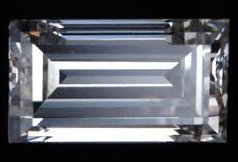 |
| Baguette Cut Diamond |
The baguette has two variations :
- Trapeze or Tapered Baguette
- Straight Baguette
 |
 |
| Tappered Baguette Cut - Viewed from Top and Bottom | Straight Baguette Cut - Viewed from Top and Bottom |
Like emerald cut, baguettes also don’t have much sparkle, but its beauty can be associated with elegance and extraordinary clarity.
Baguettes are popular in rings, bracelets, pendants and necklace where these can be set in line to have continuous flow of diamonds.
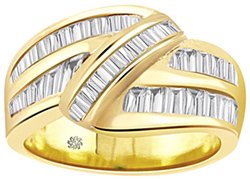 |
| Baguette Cut Diamond Bracelet |
Generally, channel setting is preferred for baguettes as its corners are very fragile and can be easily damaged. However, at times prong setting is also used.
Trillion Cut
A Trillion cut diamond has triangular shape.
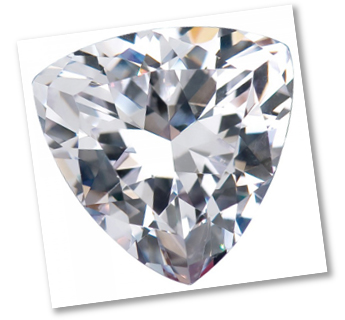 |
| Trilion Cut Diamond |
This cut has two variations:
- Curved Cut: It is preferred in solitaire (bigger trillion) and used as centre stone in rings.
- Un-curved Cut: It is preferred in smaller diamonds and used as side stones in jewelry.
Mixed Cut
As compared to other cutting forms, Mixed Cut is comparatively new cutting form developed around 1960.
This cut has got its name because it is characterized by optical brilliance of modified brilliant cut and weight retention characteristic of step cut. It adopts the cutting pattern of crown from modified brilliant cut and pavilion from step cut.
Over the period of time various cuts have come up under mixed cut category. Among those, Princess Cut has gained the maximum popularity.
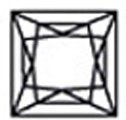 |
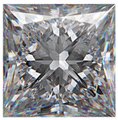 |
| Princess Cut | Princess Cut Diamond |
Princess Cut diamond has more fire and brilliance as compared to other mixed cut stones. The main reason behind Princess cut gaining such popularity is its weight retention characteristic. This cut is very popular as center stone in rings and earrings.
Return from Step Cut to Cuts of Diamond page
Return from Step Cut to Diamond Jewelry Homepage
I hope you'll not mind sharing this on Twitter, Facebook and with everyone else :)
Feel free to share if something is in your mind and want it to be covered on this site.
My Newsletter
Did you liked this article? Sign-up my FREE weekly newsletter and I'll send you more awesome new additions on this website along with latest jewelry happenings around the world, and download my Jewelry Design Album for FREE!
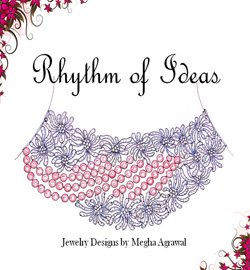 |
|

